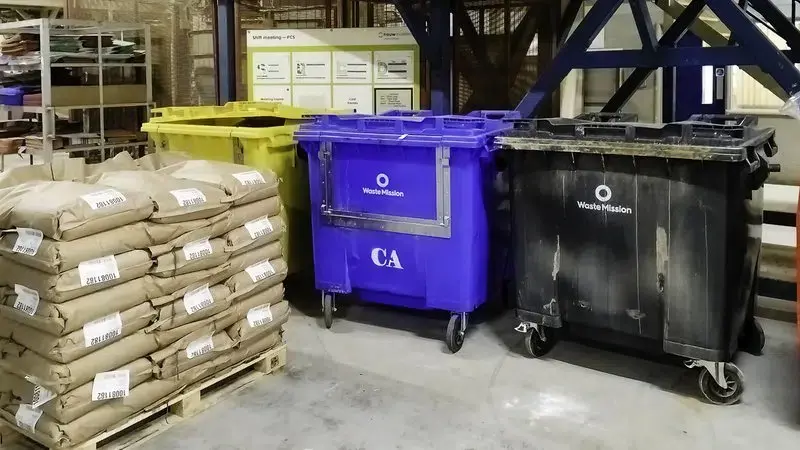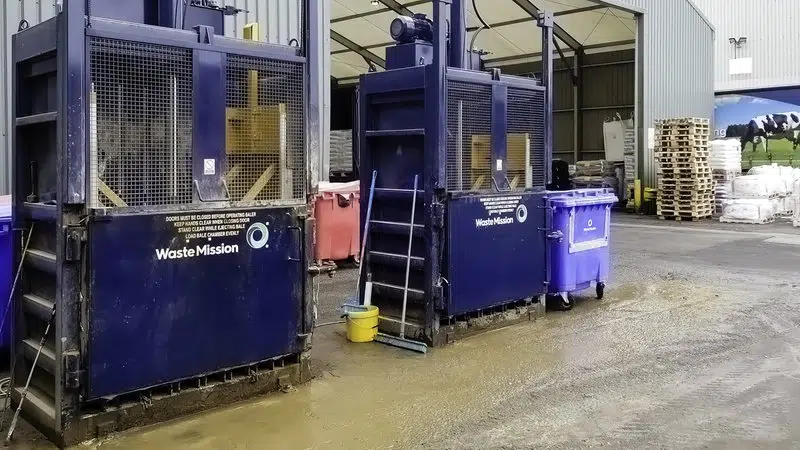Waste Mission
We believe that true sustainability means rethinking waste not as a burden, but as an opportunity. That’s why we partnered with Waste Mission to transform our waste management.
- Sustainability
In partnership with Waste Mission, we have transformed the way we manage waste across our site. By improving segregation, tackling hazardous and non-hazardous powder waste, and committing to zero landfill, we’ve not only streamlined operations and cut costs but also delivered a major sustainability milestone - saving 580 tonnes of CO₂.

Why We Took Action
We were facing challenges that many in our industry know all too well:
- Several waste streams going to landfill, including non-hazardous and hazardous powder waste (“filter waste”).
- Inefficient waste segregation, leading to recyclable material being contaminated and lost.
- High frequency of general waste collections and logistics costs.
- A mismatch between how we managed waste operationally, and our ambitions around zero landfill, circularity, and reducing our environmental impact.
We knew that simply carrying on with business as usual would not do. To be the partner of choice for sustainable nutrition, we had to lead by example - and that meant changing how we handle waste.
Our Approach: Working with Waste Mission
We chose Waste Mission as our partner because they shared our commitment to sustainability and because they were able to offer solutions that could deliver real, measurable improvements.
Over the course of about six months, we worked together to tackle our biggest waste challenges. Key parts of what we did:
- Improved Segregation & Contamination Control
We introduced clearer signage, colour-coded containers, and dedicated operatives focused on ensuring recyclables and general waste were separated properly. - Hazardous and Non-Hazardous Powder Waste Solutions
We redesigned the way we manage what we call “filter waste” so that both non-hazardous and hazardous powders could be handled sustainably — no longer destined for landfill. - Operational & Financial Efficiency Gains
By reducing contamination and improving segregation, we lowered the collection frequency for general waste, saving money and reducing site disruption. - Zero Landfill Goal
We set an ambitious target: divert 100% of our waste streams away from landfill. Thanks to the collaboration, we achieved that goal.
What We Achieved
Working with Waste Mission, the benefits we’ve seen are significant — both environmentally and financially:
- 100% Landfill Diversion — none of our waste streams now go to landfill.
- Reduced Contamination — with refined sorting / separation, recyclable materials are much cleaner and more usable.
- Cost Savings — fewer general waste collections (we went from three times a week to once every fortnight), which lowers handling and haulage costs.
- Sustainable Hazardous Waste Handling — safely dealing with powder waste that had previously been difficult to manage.
- 580 tonnes of CO₂ saved — by diverting waste away from landfill and improving efficiency, we’ve significantly cut our carbon footprint.
What we Learned
From this experience, a few lessons emerged that are useful for us in pursuing stronger waste management:
- Having clear, simple signage and consistent colour-coding makes a real difference in ensuring everyone knows what goes where.
- Engaging the whole site — operatives, management, contractors — is essential to keep standards up and contamination low.
- Setting measurable targets (like “zero landfill”) is powerful for focusing effort and tracking progress.
- Working with a partner who has technical expertise and flexibility helps us adapt solutions to our specific waste streams (like powders) rather than applying generic approaches.
Where We’re Heading Next
This zero-landfill result is a milestone, but it’s not the end of the story:
- We continue to look for ways to reduce waste at source — not just improve how we handle waste after it has been generated.
- We’re working to embed better waste practices in everything we do: procurement, packaging, site operations.
- We want to share our learnings across our operations and with our customers and suppliers so that the wider value chain can shift toward circularity.
- Tracking and reporting on our waste metrics regularly helps us stay accountable and push for continual improvement.
